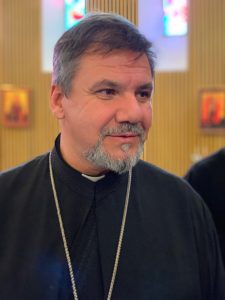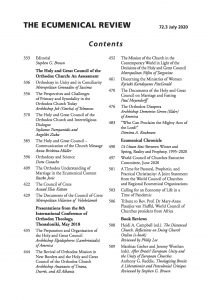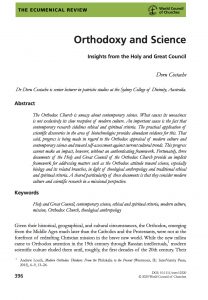 Doru Costache, AIOCS’ founding director, has just published an article in the prestigious journal of the World Council of Churches, The Ecumenical Review (72:3/2020). The article, “Orthodoxy and Science: Insights from the Holy and Great Council” (pp. 396-408) addresses the Orthodox attitude towards the scientific culture of our time as evidenced by three documents of the Holy and Great Council of the Orthodox Church (June 2016). The three documents are: “The Mission of the Orthodox Church in Today’s World,” “Encyclical of the Holy and Great Council of the Orthodox Church,” and ”Message of the Holy and Great Council of the Orthodox Church.” The great merit of the three documents consists in their approach to science and technology in apologetic and missional perspective. In so doing, they iterate the traditional/patristic way of treating the broader topic of Gospel and culture, including its narrower form, Christianity and science. This entire issue of The Ecumenical Review focuses upon the circumstances, the documents, and the reception of the Holy and Great Council.
Doru Costache, AIOCS’ founding director, has just published an article in the prestigious journal of the World Council of Churches, The Ecumenical Review (72:3/2020). The article, “Orthodoxy and Science: Insights from the Holy and Great Council” (pp. 396-408) addresses the Orthodox attitude towards the scientific culture of our time as evidenced by three documents of the Holy and Great Council of the Orthodox Church (June 2016). The three documents are: “The Mission of the Orthodox Church in Today’s World,” “Encyclical of the Holy and Great Council of the Orthodox Church,” and ”Message of the Holy and Great Council of the Orthodox Church.” The great merit of the three documents consists in their approach to science and technology in apologetic and missional perspective. In so doing, they iterate the traditional/patristic way of treating the broader topic of Gospel and culture, including its narrower form, Christianity and science. This entire issue of The Ecumenical Review focuses upon the circumstances, the documents, and the reception of the Holy and Great Council.
The Orthodox Church is uneasy about contemporary science. What causes its uneasiness is not exclusively its slow reception of modern culture. An important cause is the fact that contemporary research sidelines ethical and spiritual criteria. The practical application of scientific discoveries in the area of biotechnologies provides abundant evidence for this. That said, currently progress is being made in regard to the Orthodox appraisal of modern culture and contemporary science and toward self-assessment against current cultural trends. This progress cannot make an impact, however, without an authenticating framework. Fortunately, three documents of the Holy and Great Council of the Orthodox Church provide an implicit framework for addressing matters such as the Orthodox attitude toward science, especially biology and its related branches, in light of theological anthropology and traditional ethical and spiritual criteria. A shared particularity of these documents is that they consider modern culture and scientific research in missional perspective.


